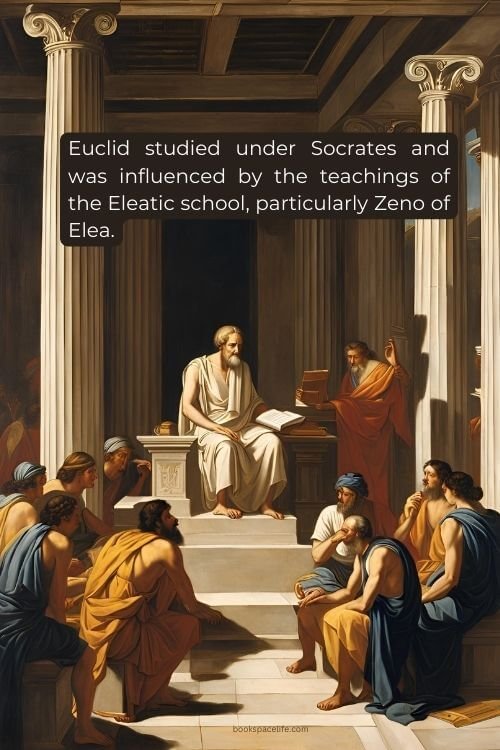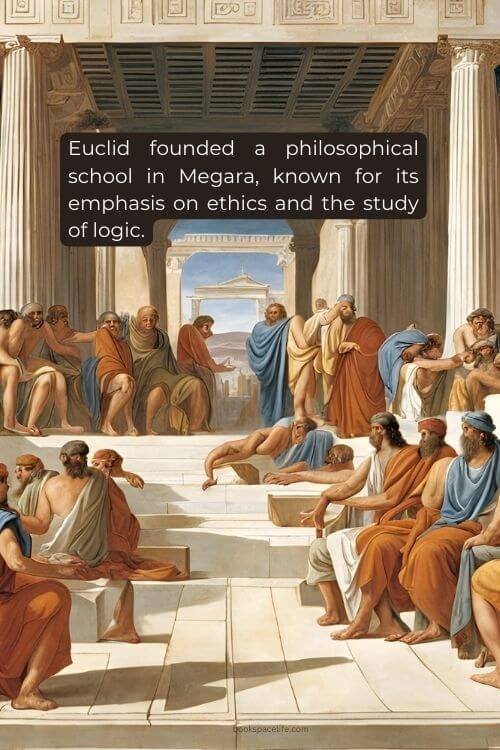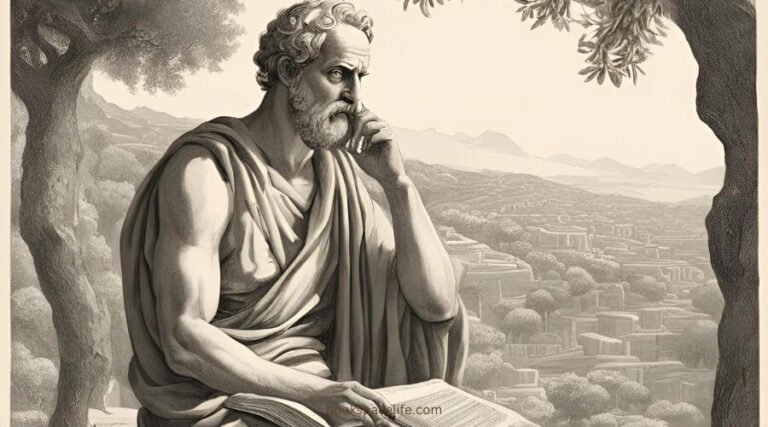Thales of Miletus
Euclid of Megara: The Philosopher of Paradox and Dialectic
Euclid of Megara (450 – 380 BCE) stands as a pivotal figure in ancient Greek philosophy, known primarily for his contributions to dialectical thought and his association with the Eleatic school.
His life and work are often overshadowed by his contemporaries and later philosophers, yet his ideas significantly influenced the development of logic, ethics, and metaphysics.
This blog post delves into the life of Euclid of Megara, including his early education, travels, philosophical contributions, and lasting impact on philosophy and logic.
Quick Read
Table of Contents
(1) Early Life and Education
Euclid was born in Megara, a city-state located near Athens, around 450 BCE. He was a student of Socrates, the renowned philosopher known for his method of inquiry and dialectical approach to philosophy.
Although little is known about Euclid’s early life, his education under Socrates provided him with a strong foundation in philosophical inquiry, particularly in ethics and metaphysics.
The teachings of Socrates emphasized the importance of questioning assumptions and seeking truth through dialogue and reason.
This influence is evident in Euclid’s own philosophical approach, which relied heavily on dialectical methods to explore concepts such as being, non-being, and the nature of reality.
In addition to Socratic teachings, Euclid was also influenced by the ideas of the Eleatic school, particularly those of Parmenides and Zeno of Elea.
These philosophers introduced complex ideas about being and non-being, which Euclid grappled with in his own work.

(2) Philosophical Contributions
Euclid of Megara is best known for his contributions to dialectics and the exploration of paradoxes. His philosophical inquiries can be summarized in several key areas:
- Dialectics: Euclid’s approach to philosophy was characterized by dialectical reasoning, a method that involves rigorous debate and the examination of opposing viewpoints. This method was not only a means of arriving at truth but also a way to clarify concepts and challenge assumptions.
He believed that dialectics could reveal the underlying principles of reality, allowing individuals to attain greater understanding.
Euclid’s emphasis on dialogue and inquiry laid the groundwork for later developments in logical and rhetorical theory.
- Paradoxes: One of Euclid’s notable contributions to philosophy is his exploration of paradoxes, particularly concerning the nature of existence and non-existence. He is credited with formulating several paradoxes that challenged traditional notions of being and non-being.
For instance, Euclid raised questions about the existence of non-being, arguing that if non-being exists, it must be something, which leads to a contradiction.
This line of reasoning reflects the influence of Parmenides and Zeno, who similarly grappled with the implications of existence and non-existence.
Euclid’s paradoxes influenced later philosophers, including Aristotle, who engaged with these ideas in his own work on metaphysics and logic.
The exploration of paradoxes became a crucial aspect of philosophical discourse, prompting thinkers to refine their understanding of concepts such as identity, change, and reality.
- Ethics and Morality: Euclid’s work also extended to ethical philosophy, where he examined the nature of virtue and the good life. His ideas often revolved around the concept of self-control and the pursuit of wisdom as the highest form of virtue.
Unlike some of his contemporaries, Euclid did not advocate for a specific ethical system but rather emphasized the importance of rational inquiry in ethical decision-making.
He believed that individuals could achieve moral clarity through dialectical reasoning, allowing them to navigate complex ethical dilemmas.
- Influence of Socratic Philosophy: Euclid’s philosophical method was deeply influenced by Socratic principles. He valued the process of questioning and dialogue as a means of uncovering truth. This Socratic influence is evident in his writings, where he often employs a dialogical format to explore complex philosophical questions.
His commitment to rational inquiry and the pursuit of knowledge mirrors the Socratic tradition, which emphasized the importance of critical thinking and self-examination.
This connection to Socratic philosophy positioned Euclid as a significant figure in the transition from pre-Socratic thought to classical philosophy.
- Existence of Abstract Entities: Euclid’s philosophical inquiries also touched on the existence of abstract entities, such as numbers and forms. While he is not primarily known for his contributions to mathematics, his exploration of abstract concepts foreshadowed later developments in mathematical philosophy.
His discussions about the nature of existence often included considerations of abstract entities, leading to a deeper understanding of the relationship between the physical and metaphysical realms.
This exploration laid the groundwork for later philosophical inquiries into the nature of abstract objects and their role in the universe.
(3) Influence and Impact
The influence of Euclid of Megara extends beyond his immediate philosophical contributions, shaping the development of logic, ethics, and metaphysics in profound ways:
- Legacy in Dialectical Thought: Euclid’s emphasis on dialectical reasoning laid the groundwork for later philosophical traditions, including the Hegelian dialectic, which sought to understand the evolution of ideas through a process of thesis, antithesis, and synthesis. His methods of inquiry influenced later philosophers, such as Aristotle, who built upon and refined dialectical reasoning in his own work.
The dialectical method has become a foundational aspect of philosophical inquiry, shaping discussions in various fields, including ethics, politics, and metaphysics.
- Impact on Ethical Philosophy: Euclid’s exploration of ethics and morality contributed to the development of ethical thought in ancient Greece. His focus on self-control and the pursuit of wisdom resonated with later philosophers, including the Stoics and Epicureans, who similarly emphasized the importance of virtue and rationality in ethical decision-making.
The idea that individuals can achieve moral clarity through dialectical reasoning remains relevant in contemporary discussions about ethics and morality, where critical thinking and self-examination are valued in ethical frameworks.
- Influence on the Eleatic School: As a member of the Eleatic school, Euclid’s work contributed to the development of Eleatic philosophy, particularly in its exploration of being and non-being. His engagement with paradoxes and dialectics added depth to Eleatic thought, influencing later philosophers, including those in the Platonist tradition.
The Eleatic emphasis on the nature of reality and the role of reason in understanding existence continues to shape philosophical discourse, prompting inquiries into the nature of truth and the limits of human understanding.
- Foundation for Logical Inquiry: Euclid’s contributions to the exploration of paradoxes and abstract entities laid the groundwork for the development of formal logic. His dialectical approach prompted thinkers to refine their understanding of logical principles, paving the way for later developments in the field of logic.
The exploration of paradoxes, in particular, has become a critical aspect of logical inquiry, prompting philosophers to grapple with the complexities of truth, contradiction, and reasoning. This legacy continues to inform contemporary debates in philosophy and logic.
- Cultural Influence: Euclid’s philosophical legacy extends beyond the academic realm, influencing literature, art, and popular culture. His emphasis on rational inquiry and the pursuit of knowledge has inspired countless individuals to seek understanding and engage in philosophical exploration.
The themes of questioning assumptions and grappling with the nature of reality resonate in various forms of artistic expression, from literature to visual arts. Euclid’s legacy as a philosopher of paradox and dialectic continues to inspire thinkers and creators alike.

(4) Conclusion
Euclid of Megara remains a significant figure in the history of philosophy, known for his contributions to dialectics, paradoxes, and ethical inquiry.
His emphasis on rational inquiry and the exploration of complex philosophical questions laid the groundwork for later developments in logic, ethics, and metaphysics.
Through his teachings, Euclid challenged traditional notions of existence, self-control, and the nature of reality, prompting future generations of philosophers to engage with these enduring questions.
In a world marked by complexity and uncertainty, Euclid’s commitment to dialectical reasoning and the pursuit of knowledge serves as a timeless reminder of the importance of critical thinking and self-examination.
His philosophical legacy continues to inspire individuals to seek understanding, question assumptions, and explore the intricacies of existence.
As we reflect on the contributions of Euclid of Megara, we recognize the enduring relevance of his ideas in shaping our understanding of philosophy, ethics, and the human experience.
(A) 7 Quick Facts on Euclid of Megara
- Date of Birth – Euclid of Megara was born around 450 BCE, during a time of significant philosophical development in ancient Greece.
- Place of Birth – He was born in Megara, an ancient Greek city located near modern-day Megara, Greece.
- Education – Euclid studied under Socrates and was influenced by the teachings of the Eleatic school, particularly Zeno of Elea.
- Travel to Athens – He traveled to Athens, where he became involved in philosophical discussions and furthered his education and understanding of dialectics.
- Philosophical Contributions – Euclid is known for his dialectical method, which emphasizes logical reasoning and debate, focusing on definitions and premises.
- Founding a School – He founded a philosophical school in Megara, known for its emphasis on ethics and the study of logic.
- Legacy – Euclid’s work laid the groundwork for future philosophers and contributed to the development of logic and dialectics in ancient philosophy.
(B) 10 Quotes attributed to Euclid of Megara
- The essence of a thing is what is important. Emphasizing the significance of understanding the fundamental nature of reality.
- It is not the voice that commands the story; it is the story that commands the voice. Highlighting the power of narrative in shaping understanding.
- A wise person does not argue for the sake of winning. Advocating for the importance of truth over victory in debate.
- To learn is to change one’s mind. Suggesting that true learning involves the transformation of beliefs and perspectives.
- The pursuit of knowledge is the pursuit of wisdom. Connecting the acquisition of knowledge with the deeper understanding of wisdom.
- An argument must be founded on solid premises. Stressing the importance of logical foundations in reasoning and discourse.
- The good is what all things strive for. Reflecting on the idea that all actions aim toward some form of goodness.
- He who knows, does not speak; he who speaks, does not know. Indicating that true understanding often transcends verbal expression.
- Real knowledge consists in knowing the limits of one’s understanding. Emphasizing humility in the pursuit of knowledge and wisdom.
- Every definition should reveal the essence of the thing defined. Highlighting the importance of clarity and precision in defining concepts.








